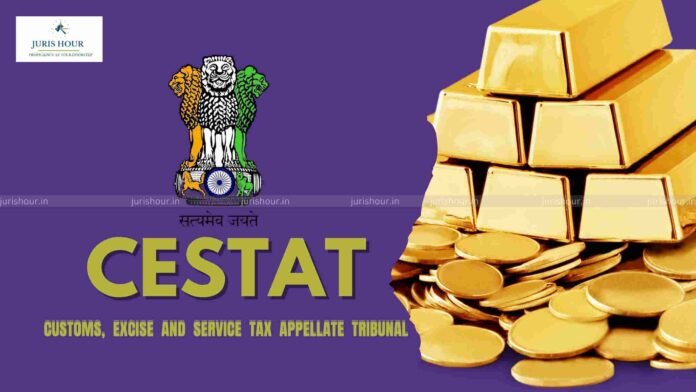The Customs, Excise and Service Tax Appellate Tribunal (CESTAT), Ahmedabad, has directed the Customs Department to pay the market value of seized gold jewellery to a passenger, Pradipbhai Sevantilal Shah after finding that the authorities had disposed of the gold without due process while the case was still under litigation.
The bench of Dr. Ajaya Krishna Vishvesha (Judicial Member) has observed that the Customs Department is accountable for improper disposal of seized gold during the pendency of legal proceedings. The government agencies act as bailees of seized property and must ensure fair treatment of owners.
The appellant/assessee, Pradipbhai Sevantilal Shah had arrived at Ahmedabad International Airport from Dubai on March 26, 2018, when officials of the Directorate of Revenue Intelligence (DRI) intercepted him after crossing the green channel. Upon search, officials recovered gold jewellery weighing 937.8 grams, comprising gold kadas and chains valued at ₹29.86 lakh (market value) and ₹26.28 lakh (tariff value).
The jewellery was seized for non-declaration under Sections 111(d), (i), (l), and (m) of the Customs Act, 1962, and later absolutely confiscated by the Additional Commissioner of Customs, Ahmedabad, through an order dated December 31, 2018. A penalty of ₹2.62 lakh was also imposed under Sections 112(a) and 112(b) of the Act.
After multiple rounds of litigation, the Revisional Authority—the Principal Commissioner and ex-officio Additional Secretary to the Government of India—passed an order on August 24, 2022, allowing the appellant to redeem the gold on payment of a redemption fine of ₹4.25 lakh, while upholding the penalty.
However, before the appellant could redeem the gold, the Customs Department had already sent the seized jewellery to the Government Mint on January 16, 2020—without notifying the appellant or any appellate authority. Later, in lieu of the gold, Customs issued a refund cheque of ₹21.17 lakh in December 2022, after deducting redemption fine, penalty, warehouse charges, and duty.
The appellant contested this calculation, arguing that he was entitled to the market value of gold prevailing on the date of refund (₹52,670 per 10 grams in December 2022), not the rate applicable when the gold was melted (₹40,986 per 10 grams in January 2020).
The appellant contended that Customs failed to comply with Section 110(1B) of the Customs Act, which mandates inventory preparation and application to a magistrate before disposing of seized goods. It was also argued that the disposal violated principles of fairness, transparency, and natural justice, since the gold was sold without notice to the rightful owner.
The Tribunal agreed, observing that the Revenue acted improperly by sending the gold to the Mint without informing the appellant or the appellate forum.
The tribunal while citing the Delhi High Court’s decision in Gor Sharian v. Commissioner of Customs (2025), held that when confiscated gold has been improperly disposed of, the department must refund the full market value prevailing on the date of payment and no duty should be deducted once penalty and redemption fine are paid.
Setting aside the Commissioner (Appeals)’ order, the Tribunal ruled that, “It was not proper on the part of the department to have sent the gold seized from the appellant to the Mint without informing him. The appeal is allowed. The Revenue shall pay the market value of gold to the appellant as it was effective on the date when the cheque of refund amount was handed over to him, after adjustment of redemption fine, penalty, warehouse charges, and applicable duty.”
The Tribunal, however, upheld the deduction of the redemption fine of ₹4.25 lakh, stating that since the appellant relied on the Revisional Authority’s order to claim the gold, he must also bear the corresponding conditions.
Case Details
Case Title: Pradipbhai Sevantilal Shah Versus Commissioner Of Customs-Customs Ahmedabad
Case No.: Customs Appeal No. 10636 Of 2024
Date: 10.10.2025
Counsel For Appellant: Hardik Modh
Counsel For Respondent: Sunita Menon
Read More: What is FERA? An explanation of India’s first foreign exchange regulation law

